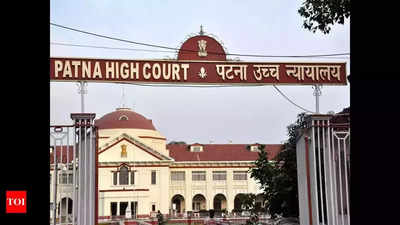- News
- City News
- patna News
- File review or go to SC: Fewer options for Bihar govt after HC cancels quota hike
Trending
File review or go to SC: Fewer options for Bihar govt after HC cancels quota hike
The Patna High Court has invalidated the Bihar government's increase in reservation from 50% to 65%, sparking a political debate. The court's decision questions the exclusion of the Bihar Reservation of Vacancies in Posts and Services Amendment Act, 2023, and the Bihar Reservation Amendment Act, 2023, from the Ninth Schedule of the Constitution, aiming to shield them from legal scrutiny.

Patna High Court
The decision has sparked political debate over the non-inclusion of the two recently enacted laws – the Bihar Reservation of Vacancies in Posts and Services (for scheduled castes, scheduled tribes, and other backward classes) Amendment Act, 2023, and the Bihar Reservation (in admission to educational institutions) Amendment Act, 2023 – in the Ninth Schedule of the Constitution to protect them from judicial scrutiny.

When the quota was raised after the caste survey in November last year, Nitish Kumar was part of the Grand Alliance. The quota hike was based on the comprehensive survey of castes, which provided a fresh estimate of the population of scheduled castes (SCs), scheduled tribes (STs), other backward classes (OBCs), and extremely backward classes (EBCs) in Bihar. Following the survey, the Nitish Kumar govt issued gazette notifications on November 21 last year, raising the quota for deprived castes from 50% to 65% in state govt jobs and educational institutions.
The court held these legislations as “ultra vires” and violative of the Supreme Court’s verdicts. “These two amended laws violate the equality clause envisaged under Articles 14, 15, and 16 of the Constitution of India,” the court said.
“The concept of reservation for backward classes was introduced to shatter the monopoly of a privileged few, which had been detrimental to the interests of the majority. However, it is crucial to recognize that merit cannot be entirely disregarded or sacrificed in the name of providing reparations. The 50% limit on reservations was established based on this principle, striking a balance between the need for affirmative action and the importance of preserving merit in the system,” the high court said while striking down the quota hike.
The 50% ceiling was introduced by the Supreme Court in its landmark 1992 decision in Indra Sawhney v Union of India to ensure “efficiency” in administration. The only exception was the 10% quota for the economically weaker section (EWS) introduced in 2019.
The high court’s ruling has significant implications for the state’s social and political landscape. The decision to increase the quota was seen as a move to empower the marginalized communities in Bihar, where caste-based discrimination and inequality remain prevalent. However, the high court’s judgment has raised questions about the constitutionality of such measures and their potential impact on the principles of equality enshrined in the Constitution.
The Bihar govt now faces the challenge of deciding its next course of action. Filing a review petition or challenging the verdict in the Supreme Court would require a strong legal basis and convincing arguments to overturn the high court’s decision. On the other hand, accepting the judgment would mean adhering to the existing reservation quota of 50%, which may not adequately address government’s move to end the socio-economic disparities faced by the deprived castes in the state.
The political ramifications of the high court’s decision cannot be ignored. The non-inclusion of the hike in the Ninth Schedule of the Constitution has become a point of contention, with some political parties criticising the govt for not taking adequate measures to protect the legislation from judicial scrutiny. The fact that the quota was raised when Nitish was part of the Grand Alliance adds another layer of complexity to the political narrative surrounding the issue.
As the Bihar govt weighs its options and the political debate continues, it is crucial to ensure that any decision taken upholds the principles of social justice, equality, and inclusive development. The welfare and empowerment of the marginalized communities should remain at the forefront of the govt’s agenda, while also respecting the constitutional framework and the rule of law.
End of Article
FOLLOW US ON SOCIAL MEDIA










